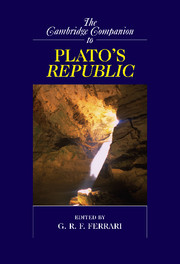Book contents
- Frontmatter
- 1 The Protreptic Rhetoric of the Republic
- 2 The Place of the Republic in Plato’s Political Thought
- 3 Rewriting the Poets in Plato’s Characters
- 4 Wise Guys and Smart Alecks in Republic 1 and 2
- 5 Justice and Virtue: The Republic’s Inquiry into Proper Difference
- 6 The Noble Lie
- 7 The Three-Part Soul
- 8 Eros in the Republic
- 9 The Utopian Character of Plato’s Ideal City
- 10 Philosophy, the Forms, and the Art of Ruling
- 11 Sun and Line: The Role of the Good
- 12 Beginning the “Longer Way”
- 13 The City-Soul Analogy
- 14 The Unhappy Tyrant and the Craft of Inner Rule
- 15 What Is Imitative Poetry and Why Is It Bad?
- 16 The Life-and-Death Journey of the Soul: Interpreting the Myth of Er
- Bibliography
- Index of Passages
- Index of Names and Subjects
- Series List
4 - Wise Guys and Smart Alecks in Republic 1 and 2
Published online by Cambridge University Press: 28 November 2007
- Frontmatter
- 1 The Protreptic Rhetoric of the Republic
- 2 The Place of the Republic in Plato’s Political Thought
- 3 Rewriting the Poets in Plato’s Characters
- 4 Wise Guys and Smart Alecks in Republic 1 and 2
- 5 Justice and Virtue: The Republic’s Inquiry into Proper Difference
- 6 The Noble Lie
- 7 The Three-Part Soul
- 8 Eros in the Republic
- 9 The Utopian Character of Plato’s Ideal City
- 10 Philosophy, the Forms, and the Art of Ruling
- 11 Sun and Line: The Role of the Good
- 12 Beginning the “Longer Way”
- 13 The City-Soul Analogy
- 14 The Unhappy Tyrant and the Craft of Inner Rule
- 15 What Is Imitative Poetry and Why Is It Bad?
- 16 The Life-and-Death Journey of the Soul: Interpreting the Myth of Er
- Bibliography
- Index of Passages
- Index of Names and Subjects
- Series List
Summary
A curious thing happens at the beginning of Republic 2. Socrates and Glaucon are seen to have sharply divergent opinions regarding Socrates' success in his preceding conversation with Thrasymachus. Socrates is sufficiently pleased with how things went that he is ready now to leave. He has made his argument against Thrasymachus who sought, first, to locate justice in the camp of vice and ignorance and, second, to claim for injustice greater profitability than justice (354b). To be sure, Socrates berates himself at the end of Book 1 for letting the question of the nature of justice get away and pursuing these lesser matters instead. And although he there insists - as he frequently does in Plato's dialogues - that until he has knowledge of the nature of a thing he can know nothing else about it, he registers no real doubt about the outcome of his arguments. Indeed, at 368b he says to Glaucon and Adeimantus that “in what I said to Thrasymachus I thought I showed that justice is better than injustice.” The only reason Socrates feels he must stay is because, as he observes, “you did not accept it from me.” Glaucon, and apparently Adeimantus as well, are, then, far less sanguine about Socrates' performance than Socrates himself is. What Socrates regards as a done deal, Glaucon and Adeimantus make him see as a mere “prelude” (357a).
- Type
- Chapter
- Information
- The Cambridge Companion to Plato's Republic , pp. 90 - 115Publisher: Cambridge University PressPrint publication year: 2007
- 3
- Cited by



